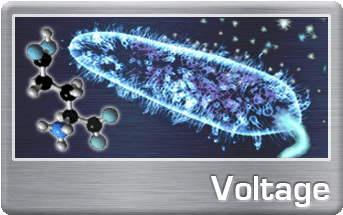|
Background
- The voltage output part of our project aims to mimic the signal transduction that occurs at a neural synapse.
- We are engineering E.coli to create a voltage output on detection of glutamate. This imitates the creation of a postsynaptic potential in a dendrite when a neurotransmitter (such as glutamate) is present at the synapse.
- The mechanism we have designed is similar to that used in the brain – relying on ion movement across the membrane, and gated ion channels.
- To simplify the concept, we are only regulating and measuring the flux of potassium (K+) ions, and we are using a directly glutamate-gated K+ ion channel.
- This means that on the binding of glutamate, the channels will open, allowing a K+ flux, which will change the voltage of the medium enough to be detected with a very sensitive electrode.
- In order to set up a large enough K+ concentration gradient across the membrane for ions to flow down when the channels open, cells are grown in high K+ medium (100mM) and resuspended in low K+ medium.
- However, E.coli also has a number of osmoregulatory systems which use relative K+ ion concentrations to control turgor. There are K+ leak channels (Kch and Kef) in the membrane, so we have chosen E.coli strains with mutations in these genes as our chassis.
Experiment Summaries
Electrical Output
Mutant Growth Rates
Cytoplasmic K+ Concentrations
Parts Construction:
Technical Information
Gene Design
Flame Photometer Calibration
OD600 (Cell Density) Calibration
Mutant Strains Information
Useful Links
[http://expasy.org/tools/ Protein prediction tools]
[http://www.uniprot.org/ Uniprot database]
Presentation
Literature
[http://www.pubmedcentral.nih.gov/articlerender.fcgi?artid=1214631| Kdp operon diagram]
[http://www.jbc.org/cgi/content/abstract/276/13/9590|Kdp plasmid]
[http://www.springerlink.com/content/6042632827845551/ The Kdp-ATPase system and its regulation]
Potential Chassis: [http://cgsc.biology.yale.edu/Strain.php?ID=107402 |Strain JW1242-1]
[http://cgsc.biology.yale.edu/Strain.php?ID=107065 Strain JW0710-1]
[http://www.ncbi.nlm.nih.gov/pubmed/4942756 Kdp mutant - paper from 1971]
[http://www.shigen.nig.ac.jp/WGR/link/link_E.coli_e.html Worldwide E.coli Databases]
[http://jb.asm.org/cgi/content/abstract/188/5/1950 Characterisation of kdpD - 2005]
[http://jb.asm.org/cgi/content/full/180/19/5102 Investigations on Kdp Operon exp. & flux]
[http://dx.doi.org/10.1006/jmbi.2001.4884 Very interesting 2001 paper concerning Glutamate Channels]
[http://www.nature.com/nature/journal/v402/n6763/full/402817a0.html 1999 paper on functional characterization of prokaryote Glu Channels]
[http://www.ncbi.nlm.nih.gov/entrez/viewer.fcgi?db=nucleotide&val=BA000022 Sequenced Synechocystis PCC 6803 genome]
[http://www.ncbi.nlm.nih.gov/entrez/viewer.fcgi?val=47118304&from=1401809&to=1403002&view=gbwithparts Glutamate-gated K+ channel GluR0]
[http://redpoll.pharmacy.ualberta.ca/CCDB/cgi-bin/STAT_NEW.cgi| Link to E.coli statistics page (CCDB Database)]
|  "
"
